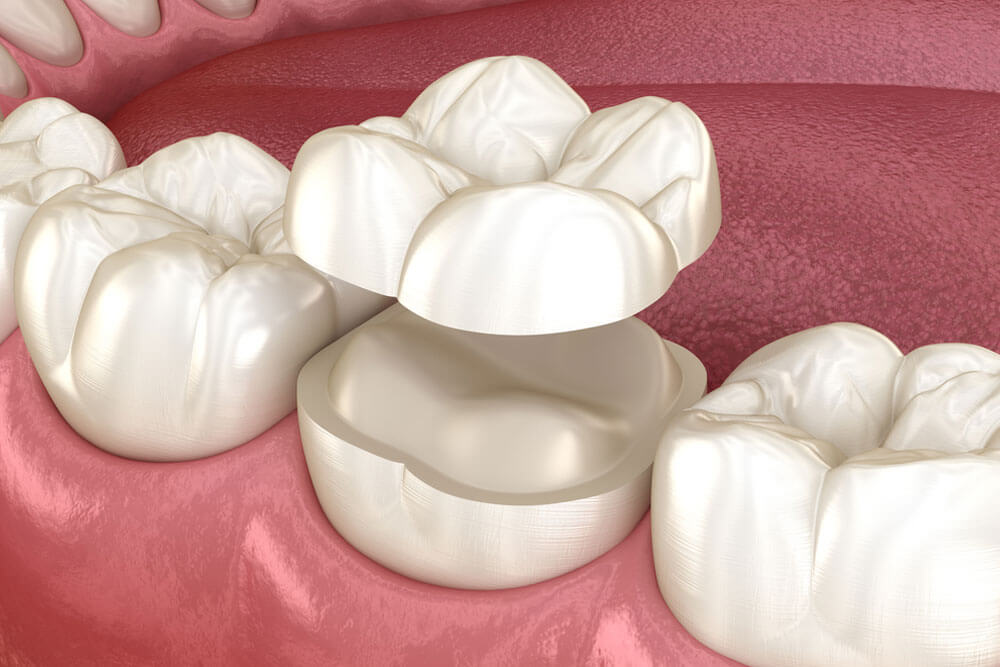Why would a dentist recommend a dental crown?
A dentist might recommend a dental crown when a tooth is broken, as it helps protect and restore the tooth. Additionally, for front teeth, crowns can enhance appearance, addressing issues like staining, breakage, or wear over time. Furthermore, dental crowns are advised for teeth that have undergone root canal treatment, as these teeth become brittle and require the protection a crown provides.
How do front tooth crowns differ from those on back molars?
Front tooth crowns are designed with aesthetic porcelain materials to achieve a natural look that blends with adjacent teeth. For back molars, a combination of porcelain and metal or strong zirconia might be used to ensure durability and manage the pressures of biting.
Can front tooth crowns look natural?
Front tooth crowns can indeed appear very natural due to high-quality porcelain that mimics the appearance of real teeth. This allows for a seamless integration with the rest of your teeth.
Why are crowns necessary after a root canal?
After a root canal procedure, placing a dental crown is vital. The treated tooth becomes dry and brittle, increasing the risk of fractures. A crown provides the necessary protection to ensure the longevity of the tooth.
Is it possible to combine a root canal and crown in a single visit?
Yes, in many cases, both a root canal and crown can be completed during a single visit. This approach saves time and effectively restores the tooth’s function and appearance.
What does the process of placing a dental crown involve?
The process of placing a dental crown includes numbing the tooth, reshaping it to accommodate the crown, and taking precise scans. Skilled professionals then craft a crown that fits accurately and comfortably.
Can children also receive dental crowns?
Yes, dental crowns can be applied to children’s teeth as well. While the type of crown used for children differs, the procedure can address issues like broken teeth, providing necessary protection.
Is there pain associated with dental crown placement?
Dental crown placement is not painful due to numbing during the procedure. Any temporary sensitivity can be managed with over-the-counter pain relievers.
How long do dental crowns typically last?
Dental crowns generally have a lifespan of 10 to 15 years. With good oral hygiene and regular checkups, their durability can be extended.
What might cause tooth pain under a crown?
Tooth pain beneath a crown often results from decay. If decay is present, the crown must be removed, the cavity treated, and a new crown placed.
Does dental insurance cover the cost of dental crowns?
Dental insurance might cover necessary dental crowns, particularly for functional reasons. Cosmetic crowns, however, might not be covered.
Schedule an Appointment
For any questions or concerns about dental issues, it’s recommended to contact the dental office and schedule a consultation. This allows for a detailed discussion and personalized answers to your concerns. Should you have additional inquiries or concerns, please don’t hesitate to call us at (650) 367-4300. We are here to assist you.
Most dentistry looks like dentistry. Our goal is to provide dentistry that is undetectable. We replace existing crowns and fillings with restorations that look and feel like your natural teeth.
Where damage to a person’s teeth is extreme, and apparently beyond repair, we can use porcelain or porcelain “pasted on gold” crowns to make the smile appear “as new”. This is an extremely reliable technique for repairing the most severe of dental problems, even permanently replacing missing teeth to offer a complete smile and a functional bite. We are renowned for the quality of our work and the fantastic changes we make for people using this technology. These treatments are used for a long-lasting correction of major dental problems. It is usual for these treatments to last for 20 to 30 years, which is as close to permanent as dental treatment can get.
How long does it take to fit a dental crown?
Fitting a crown requires at least two visits to our office. Initially, we will remove decay, shape the tooth, and fit it with a temporary crown of either plastic or metal.
On the subsequent visit we will remove the temporary crown, and then fit and adjust the final crown. Finally, we will cement the crown into place and you have a new beautiful looking tooth.
Key Benefits of Dental Crowns
- Replaces missing teeth
- Offers support to misshapen teeth or badly broken teeth
- Looks completely natural
- Fixes “smile” and functional chewing problems
What are the capabilities of crowns?
Crown and bridgework is a very reliable solution for major dental problems caused through accidents, diseases or wear and tear. Major problems can usually be corrected using these techniques. Material used in these repairs is either high-grade porcelain, or porcelain bonded to gold. A higher strength of the porcelain and gold materials is recommended to treat the most serious of dental problems. Where accidental damage has occurred, resulting in lost teeth, or where teeth have broken away through excessive wear, or as the result of old fillings breaking, crowns and/or bridges can be used as a long-term solution.
Many people have unexplained pain from filled back teeth, which is usually due to hairline cracks in the chewing part of the tooth. Placing crowns on these teeth relieves the pain and allows a return of full dental function for these teeth. In front teeth, older fillings can both weaken the teeth and cause “appearance” problems due to staining or chipping. Porcelain crowns and bridges are suitable in cases where porcelain veneers are not. In teeth with root canal fillings, crowns can prevent breakage.

